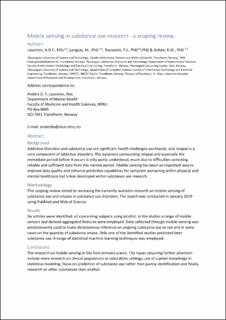| dc.contributor.author | Lauvsnes, Anders Dahlen Forsmo | |
| dc.contributor.author | Langaas, Mette | |
| dc.contributor.author | Toussaint, Pieter Jelle | |
| dc.contributor.author | Gråwe, Rolf W. | |
| dc.date.accessioned | 2023-04-28T13:32:23Z | |
| dc.date.available | 2023-04-28T13:32:23Z | |
| dc.date.created | 2020-04-29T23:12:28Z | |
| dc.date.issued | 2020 | |
| dc.identifier.citation | Telemedicine journal and e-health. 2020, 26, 10, 1191-1196. | en_US |
| dc.identifier.issn | 1530-5627 | |
| dc.identifier.uri | https://hdl.handle.net/11250/3065625 | |
| dc.description.abstract | Background:Addictive disorders and substance use are significant health challenges worldwide, and relapse is a core component of addictive disorders. The dynamics surrounding relapse and especially the immediate period before it occurs is only partly understood, much due to difficulties collecting reliable and sufficient data from this narrow period. Mobile sensing has been an important way to improve data quality and enhance predictive capabilities for symptom worsening within physical and mental health care, but is less developed within substance use research.
Methodology:This scoping review aimed to reviewing the currently available research on mobile sensing of substance use and relapse in substance use disorders. The search was conducted in January 2019 using PubMed and Web of Science.
Results:Six articles were identified, all concerning subjects using alcohol. In the studies a range of mobile sensors and derived aggregated features were employed. Data collected through mobile sensing were predominantly used to make dichotomous inference on ongoing substance use or not and in some cases on the quantity of substance intake. Only one of the identified studies predicted later substance use. A range of statistical machine learning techniques was employed.
Conclusions:The research on mobile sensing in this field remains scarce. The issues requiring further attention include more research on clinical populations in naturalistic settings, use of a priori knowledge in statistical modeling, focus on prediction of substance use rather than purely identification, and finally research on other substances than alcohol. | en_US |
| dc.language.iso | eng | en_US |
| dc.publisher | Mary Ann Liebert | en_US |
| dc.title | Mobile Sensing in Substance Use Research: A Scoping Review | en_US |
| dc.type | Peer reviewed | en_US |
| dc.type | Journal article | en_US |
| dc.description.version | acceptedVersion | en_US |
| dc.source.pagenumber | 1191-1196 | en_US |
| dc.source.volume | 26 | en_US |
| dc.source.journal | Telemedicine journal and e-health | en_US |
| dc.source.issue | 10 | en_US |
| dc.identifier.doi | 10.1089/tmj.2019.0241 | |
| dc.identifier.cristin | 1808732 | |
| cristin.ispublished | true | |
| cristin.fulltext | postprint | |
| cristin.qualitycode | 1 | |
